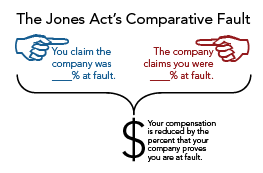- Maritime Cases
- Maritime Injuries
- Admiralty Laws
- How Claims Work
- During Your Case
- Hiring an Attorney
- Attorneys
- About The Young Firm
- Helpful Info
- Resources
- Client Portal Hub
Get Answers. Move Forward.
504-680-4100
Under the Jones Act, an injured offshore worker can file a lawsuit against his or her employer directly to collect financial damages for employer negligence that caused or led to the injury. There are two primary items to keep in mind with regard to suing your employer under this law:
 employer proves in trial that you were at fault for 50 percent of your own injury, your damages will be reduced by that percentage. Because of this rule, nearly all employers will immediately attempt to place blame on the injured employee. The company will try to take a recorded statement from the employee immediately to pre-emptively protect itself against any claim that the employee might later make placing them at fault.
employer proves in trial that you were at fault for 50 percent of your own injury, your damages will be reduced by that percentage. Because of this rule, nearly all employers will immediately attempt to place blame on the injured employee. The company will try to take a recorded statement from the employee immediately to pre-emptively protect itself against any claim that the employee might later make placing them at fault.The Young Firm strongly advises injured workers to detail specifically how the offshore accident occurred, and to include clear statements of any fault on the part of their employer or co-employees on filed injury reports. Employees must also list any unsafe condition or damaged equipment that may have played a role in their accident.